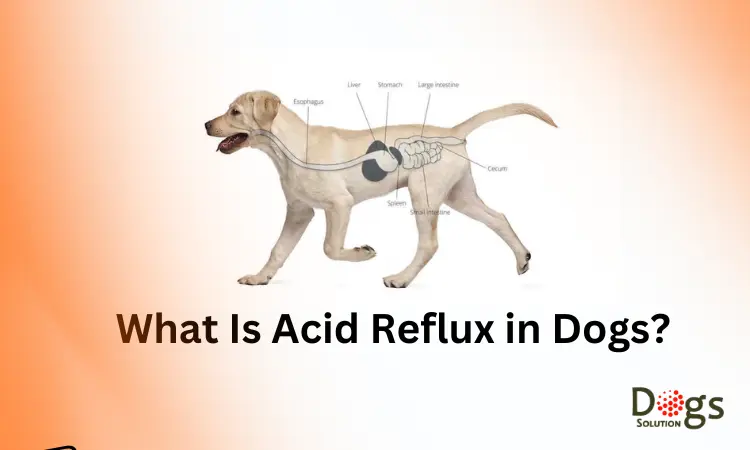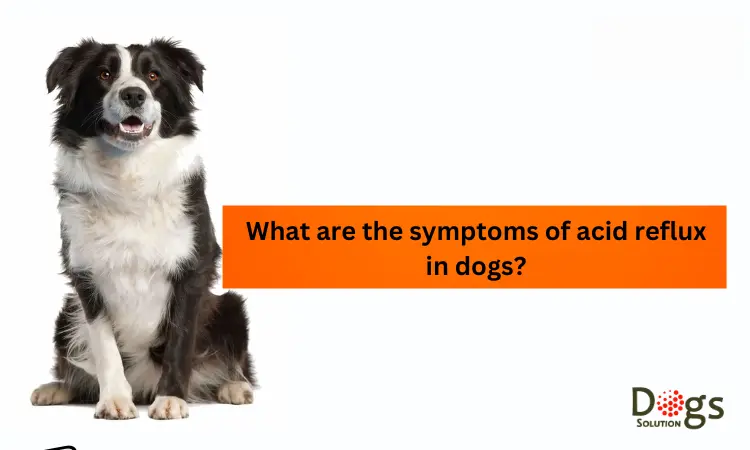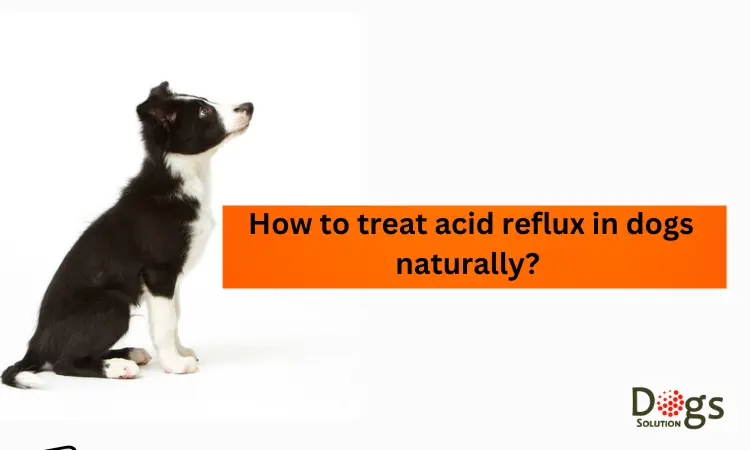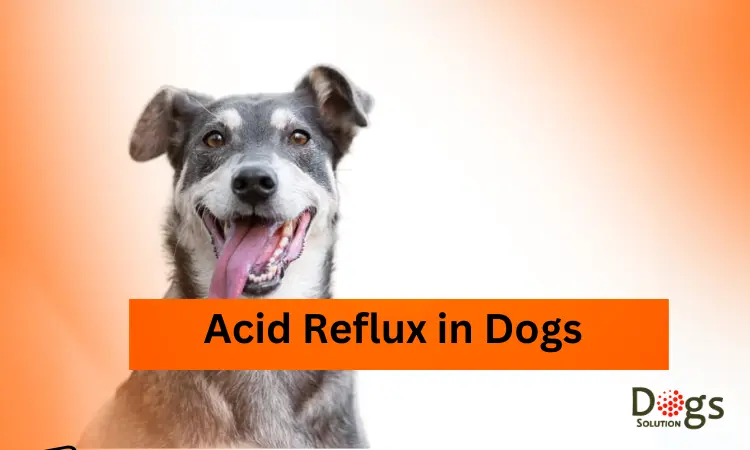Did you know that acid reflux can affect dogs? Dogs are prone to indigestion and other stomach issues that cause acid reflux, just like people are. If you’ve ever experienced acid reflux, you are aware of how unpleasant, painful, and even terrifying it can be. Let’s talk about: what is Acid Reflux in Dogs, how to treat dogs acid reflux, what it looks like, and lifestyle modifications that might help your dog avoid this bothersome condition.
What Is Acid Reflux in Dogs?
A disorder known as gastroesophageal reflux disease (GERD) causes digestive or stomach secretions to back up into the esophagus. This could be the result of a relaxed muscle opening at the base of the esophagus. This can happen during anesthesia, but it can also happen for other reasons that are not known.

It’s believed that dogs frequently experience gastroesophageal reflux, commonly known as “acid reflux.” Though younger pups and brachycephalic (flat-faced) dogs are more susceptible, it can happen to any dog (and cats, too).
The gastrointestinal juices, which include bile salts, pepsin, and stomach acid, harm the esophageal mucosa’s protective coating. Esophagitis, or inflammation of the esophagus, may arise from this.
What are the symptoms of acid reflux in dogs?
Dogs suffering from acid reflux, also known as gastroesophageal reflux disease (GERD), may exhibit a range of symptoms that vary from dog to dog. Since some dogs might not show obvious symptoms, pet owners must identify common symptoms to treat the problem as soon as possible. Do you want to know: signs of acid reflux in dogs?

The following are a few common acid reflux in dogs symptoms: :
Regurgitation:
Dogs that experience this common symptom—which is different from vomiting—expel partly or partially digested food, stomach acid, and bile.
Vomiting:
Dogs with GERD are more likely to regurgitate, but some may also throw up sometimes.
Hypersalivation:
Due to excessive salivation, which is the body’s reaction to esophageal irritation and inflammation, dogs with acid reflux disease (GERD) may drool a lot.
Swallowing repeatedly or gagging:
Due to the irritation caused by an inflamed oesophagus, dogs with acid reflux may exhibit dysphagia, or difficulty or discomfort during swallowing.
Persistent coughing or gagging:
When changing positions or experiencing other esophageal irritation, acid reflux can cause coughing or gagging, which can happen more frequently in the evening.
Halitosis:
Dogs with GERD may have bad-smelling breath due to the accumulation of bile and stomach acid in their mouths and oesophagi.
Stress or restlessness:
Canines suffering from GERD may pace, bark, or show other signs of restlessness.
What Causes Acid Reflux in Dogs?
Any dog can experience acid reflux, which can be brought on by anatomical defects, chronic conditions, or anaesthesia after a medical operation. Finding the reflux’s underlying cause is crucial to choosing the right acid reflux in dogs treatment. It might be simpler to treat some illnesses than others.
Chronic Vomiting:
Drugs or medical conditions can occasionally cause dogs to throw up for an extended period. This may result in acid reflux and the esophageal irritation that follows.
Anesthesia
The gastroesophageal sphincter, which ordinarily keeps stomach contents from passing back up the oesophagus, relaxes in dogs given anaesthetic medications. Stomach contents may spill out of the stomach and into the oesophagus if a dog is put under anaesthesia with its head positioned below the stomach.
Hiatal Hernia
This abnormality, also called a diaphragmatic hernia, may make acid reflux more likely. When the diaphragm opens, enabling a portion of the stomach, intestines, or liver to enter the chest cavity, the condition is known as a hiatal hernia. Acid reflux is probable as a result of the stomach’s incorrect posture. On an X-ray, a large hiatal hernia is frequently visible, while smaller hernias could be more difficult to spot.
Acid Reflux Diagnosis
A veterinarian will frequently conduct an esophagoscopy to identify acid reflux. During an esophagoscopy, a camera is inserted into your pet’s oesophagus to check for bleeding or any changes to the lining. To assess your pet’s health and search for underlying issues that could be the cause of acid reflux, your veterinarian might also perform a urinalysis and blood testing.
In the case that these procedures reveal nothing, your veterinarian can request X-rays to check for tumors, hernias, or any other irregularities that might be impairing your pet’s ability to use their esophageal muscles correctly or disturbing their stomach.
To manage acid reflux and prevent dehydration and nutrient depletion, it is fundamental that your pet receive competent medical attention.
How to treat acid reflux in dogs naturally?
To control acid reflux, diet modifications and medication are required. After a day or two of dietary restriction, low-fat and low-protein meals are often given at regular, tiny intervals over the day.

In the event that your dog’s reflux is due to a hiatal hernia, surgery can also be necessary. Treatment is often overseen by the dog owner at home, with the exception of surgery.
Prognosis for a Dog with Acid Reflux
Acid reflux and chronic bile vomiting can cause esophagitis, or inflammation of the oesophagus, if they are not treated.
This may result in difficulty swallowing, an inability to eat, and weight loss. When treated appropriately with diet restrictions, drugs, or surgery when needed, the dog’s oesophagus will heal and the reflux will significantly lessen.
How to Prevent Acid Reflux?
You can ease your dog’s acid reflux by feeding them soft food that is low in fat. Their digestive enzymes won’t have to work as hard to break down their food if they follow this diet. Meals that are smaller and more frequent can also ease the strain on their digestive systems.
Final Words:
Dog acid reflux is a multifaceted disease that may result in your pet experiencing agony and distress. Knowing the typical signs of acid reflux is critical in order to promptly diagnose and treat the condition. A physical examination, medical history, X-rays, blood tests, esophagoscopy, and barium swallow studies are frequently used in the diagnosis process. In addition to dietary modifications, treatment may involve the use of pharmaceuticals such as antacids, proton pump inhibitors (PPIs), H2 blockers (histamine-2), and promotility medicines.
Dogs with acid reflux can be successfully treated and lead happy, healthy lives with prompt diagnosis and treatment from their veterinarian! Contact your veterinarian if you have any questions or concerns regarding your dog’s acid reflux.
Dogs Solutions is your go-to resource if you’re worried about your dog’s wellbeing.
Check out our most recent blogs and practice proper Cannie parenting!
What dog breeds are prone to acid reflux?
Some breeds, such Boston terriers, English bulldogs, and pugs, have shorter esophages and are more likely to develop hiatal hernias, which makes them more prone to regurgitation and vomiting. In these short-headed and squished-nose dog breeds, both of these characteristics facilitate acid reflux.
What foods should dogs with acid reflux avoid?
Acid reflux may be more likely and difficult to digest after eating fatty foods. Avoid of giving your dog foods heavy in fat, including fatty meat cuts or snacks. Acidic foods like tomatoes and citrus fruits might make acid reflux symptoms worse. Steer clear of giving your dog these kinds of foods.
Is raw food good for dogs with acid reflux?
Foods that have been processed, like kibble, cause a lot of inflammation, which eventually lowers stomach acid. Because there is less stomach acid to break down food, a decrease in stomach acid can be a main cause of acid reflux. Dogs with acid reflux may be fed fresh either raw or very minimally cooked.
How can I settle my dogs acid reflux?
The ideal diet for dogs with GERD is typically a low-fat prescription diet. This lessens the amount of stomach acid produced. Reflux into the oesophagus can also be lessened by eating small, frequent meals. Finally, there’s a good chance that reflux will still happen to some extent even with all of these precautions.
What is a herbal remedy for acid reflux in dogs?
There are soothing herbs, antacid plants. These consist of marshmallow root, licorice, ginger, and slippery elm. These can relieve esophageal and stomach lining inflammation. Supplements that coat the stomach, such as organic aloe vera juice, can be added.






